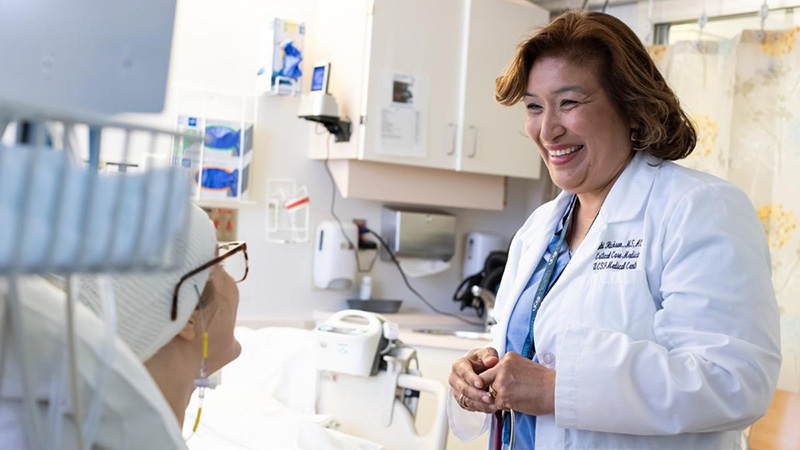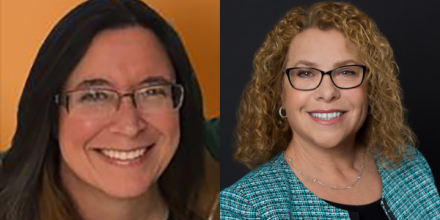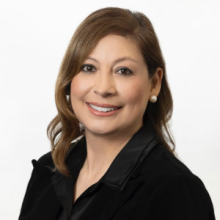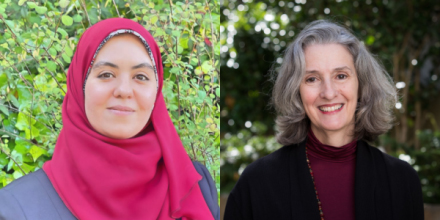UC nurses are working to change health policy
Share This Article

By Lisa Klope, UCSF
An intensive care unit nurse for over 25 years, Rubi Alva de Hickson, M.S., R.N., N.P., never expected to be involved in health policy work — let alone lead it.
But that changed when she enrolled in the UCSF School of Nursing’s Post-Master’s Entry to the Doctor of Nursing Practice (DNP) pathway where she learned how to engage in the legislative process as a nurse leader.
Today, she is the driving force behind a movement to change the Spanish translation of “nurse practitioner” used in California law — a translation she says inadequately represents the full scope of a nurse practitioner’s training, responsibilities and level of education.
“Without correct language, patients will not understand that their nurse is trained to diagnose, prescribe and lead their care,” says Alva de Hickson, adding that precise language is an important step in educating patients and combatting the stereotype of the subservient nurse.
Student-led advocacy in action
California nurse practitioners are legally required to identify themselves as “enfermero(a) especializado(a)” when speaking to patients who primarily speak Spanish. The term translates to “specialized nurse” — a general category that includes nurses who are not advanced practice providers.
Working with legislators and the California Board of Nurse Practitioners, Alva de Hickson is fighting to update the language to the direct translation of nurse practitioner — “enfermero(a) practicante avanzada.”
Her work is attracting national attention. Recently, the National Association of Hispanic Nurses (NAHN) – the country’s leading professional society for Latino nurses – released an official statement advocating for the change in terminology.
“Rubi has the potential to improve linguistic precision in California health policy not only for the Spanish-speaking community, but for all communities that speak a language other than English,” says Leslie Dubbin, Ph.D., R.N., associate professor.
Dubbin and Juli Maxworthy, DNP, R.N., associate professor, co-teach the course Advanced Health Policy and Advocacy. “Their class helped me learn the legislative process and how to advocate effectively as a provider,” explains Alva de Hickson, who will graduate from the school this June.

Leslie Dubbin and Juli Maxworth co-teach the course “Advanced Health Policy and Advocacy,” which teaches nursing students how to advocate as providers.
During the course, students identify a health policy problem, design potential solutions, produce a policy memo and conduct a comparative analysis between United States and international health systems.
“By conducting a global comparison, students think more broadly about possible health policy interventions, recommendations and solutions,” says Dubbin.
Students learn to design, implement and advocate for health care policies that address health equity, essential components of the training for a doctorally prepared nurse, says Maxworthy. “We hope students learn that if they do not engage with health policies, then they cannot render the care they want to provide.”
Post-Master’s DNP student Leticia Mendoza Wilke, CNS, and Alva de Hickson traveled to Washington D.C. this year to participate in NAHN’s annual Health Policy Summit. During the three-day event, they met with legislators on Capitol Hill to advocate for policies to improve care for Latino patients and providers.

Leticia Mendoza Wilke joined Rubi Alva de Hickson in traveling to Washington, D.C., where they met with legislators to advocate for Latino patients and providers.
“Attending the summit while enrolled in Advanced Health Policy and Advocacy made me realize how much I’m learning in the DNP program about policy process and how to engage in it,” shares Mendoza Wilke, who has been employed for over 15 years in the outpatient adult endocrinology clinic at Stanford Health Care, where she works to improve diabetes outcomes for Latino patients.
“UCSF’s program has given me tools to leverage my expertise and experiences to effect broader systemic challenges in health care, particularly in my work to address disparities among Latino communities,” she says.
Alva de Hickson agrees. For her DNP project — the program’s culminating assignment — she is designing a toolkit to share what she has learned with other nurses new to advocacy. “From working on boards to speaking with legislatures, the toolkit provides practical steps for nurses navigating the policy process for the first time.”
Promoting health quality and equity
The School of Nursing is one of the very few schools in the country that specifically trains nurses to engage in all levels of public health and public policy. For over 20 years, students have learned to assess how policies impact clinical issues and develop tools to influence policy — all with the goal of promoting health quality and equity. The better nurses understand policy, the more effective they are in changing it.
“We want students to understand that clinical problems are very much influenced by the policy environment,” says Stella Bialous, Dr. PH, R.N., FAAN, professor.
Bialous, an internationally recognized health policy expert, teaches Theories of the Health Policy Process. The course focuses on critical thinking, policy and ethical reasoning about the discipline of nursing and how it contributes to health policy. Students produce a paper identifying a policy problem impacting their practice, applying a theoretical framework and recommending solutions.
“The course gave me a sense of empowerment and agency,” says Shaimaa Elrefaay, MSN, R.N., a student in the school’s Ph.D. in Nursing program. “I feel equipped to impact the policies affecting my work and my patients.”
Elrefaay’s culminating paper explored access to mental health care among Arab immigrants in the U.S. and was recently published.

Doctoral nursing student Shaimaa Elrefaay (left) recently published a paper on mental health care among Arab immigrants in the U.S. that was written for a health policy course taught by Stella Bialous (right).
Students come from diverse backgrounds and specialties which makes the class dynamic. Nurses working in environmental health collaborate with those supporting birthing people or others working with incarcerated populations, explains Bialous.
Before the class, Elrefaay says she identified as a nurse clinician and a nurse researcher. “Now, I realize the importance of also being a nurse advocate. Bridging practice, research and policy is necessary to improve health outcomes, especially for marginalized communities.”
